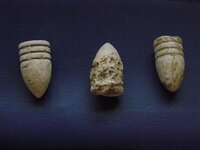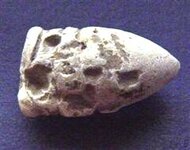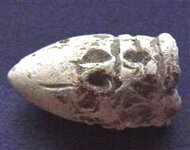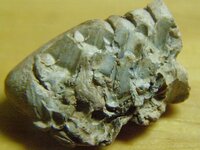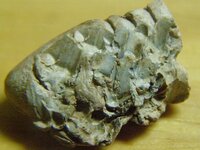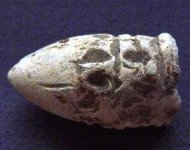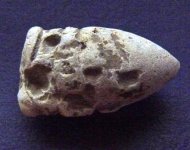Navigation
Install the app
How to install the app on iOS
Follow along with the video below to see how to install our site as a web app on your home screen.
Note: This feature may not be available in some browsers.
More options
You are using an out of date browser. It may not display this or other websites correctly.
You should upgrade or use an alternative browser.
You should upgrade or use an alternative browser.
Last Hunt of 2007(Chewed Bullet)
- Thread starter gmstreet
- Start date
tymcmurray
Gold Member
Nice finds.
Got a chewed bullet verified by a dentist to be human.
Don't let anyone tell ya different!!!
Enjoy your cool finds!
Got a chewed bullet verified by a dentist to be human.
Don't let anyone tell ya different!!!
Enjoy your cool finds!

ballbuster
Jr. Member
- Sep 27, 2006
- 95
- 0
Don't want to get off topic, but whats the story with chewed bullits?
Jim
Jim
{Sentinel}
Silver Member
tymcmurray said:Nice finds.
Got a chewed bullet verified by a dentist to be human.
Don't let anyone tell ya different!!!
Enjoy your cool finds!
Yes you did my good friend! And I posted a pic 'demonstrating' how to "bite a bullet". Bitten bullets were and are found throughout battle and campsites of the Civil War. Soldiers who were wounded used them to bite down on when in pain or when having a limb amputated etc. In addition, they were used to keep soldiers mouths moist and many mindlessly bit on them while passing the time....This of course was before we knew lead was bad for you

So of course this is still a quite common practice in China?{Sentinel} said:tymcmurray said:Nice finds.
Got a chewed bullet verified by a dentist to be human.
Don't let anyone tell ya different!!!
Enjoy your cool finds!
Yes you did my good friend! And I posted a pic 'demonstrating' how to "bite a bullet". Bitten bullets were and are found throughout battle and campsites of the Civil War. Soldiers who were wounded used them to bite down on when in pain or when having a limb amputated etc. In addition, they were used to keep soldiers mouths moist and many mindlessly bit on them while passing the time....This of course was before we knew lead was bad for you
Prober
Bronze Member
Great old bullets! What do they ring up as?
cival war hunter 2 !
Hero Member
- Dec 29, 2007
- 615
- 1
Nice find, were do you have to go to find stuff like that?
wvdrummer
wvdrummer
mastereagle22
Silver Member
- May 15, 2007
- 4,909
- 31
- Detector(s) used
- E-trac, Explorer II, Xterra30, Whites Prizm IV
I keep searching for my first three-ringer! Found what I believe to be a Confederate 69 shot the other night. That chewed bullet is nice.
BioProfessor
Silver Member
Here we go again.
Soldiers did chew bullets and they did leave some shallow bite marks. Native Americans chewed rocks. Most every civilization has some reference to something being chewed to stimulate salivation. But they did not chew on bullets for pain during amputations. http://www.braceface.com/medical/Articles/Civil_War_surgery_truth.htm
The Truth About Civil War Surgery
If you think Civil War surgeons were ill-trained sawbones who loved to amputate -- usually without anesthesia -- you need to read this!
By Alfred Jay Bollet, M.D.
As published on the HistoryNet.com: Civil War Times 2004
Myth 2: Surgery Was Done without Anesthesia
Histories of the Civil War and Hollywood movies usually portray surgery being done without anesthesia; the patient downs a shot of whiskey, then bites down on a bullet. That did happen in a few instances, particularly on September 17, 1862, at the Battle of Iuka, Mississippi, when 254 casualties were operated on without any anesthetic. This episode is recorded in the Medical and Surgical History of the War of the Rebellion and is the only known occurrence of any significant number of operations being performed without anesthesia. On the other hand, more than 80,000 Federal operations with anaesthesia were recorded, and that figure is believed to be an underestimate. Confederate surgeons used anesthetics a comparable number of times. The use of anaesthesia by surgeons doing painful wound treatments in hospitals was well described but not tallied.
One explanation for the misconception about anesthesia is that it was well into the 20th century before research led to more carefully designed applications. At the time of the Civil War, ether or chloroform or a mixture of the two was administered by an assistant, who placed a loose cloth over the patient's face and dripped some anesthetic onto it while the patient breathed deeply. When given this way, the initial effects are a loss of consciousness accompanied by a stage of excitement. For safety reasons, the application was usually stopped quickly, which is why surprisingly few deaths occurred. The Civil War surgeon went to work immediately, hoping to finish before the drug wore off. Although the excited patient was unaware of what was happening and felt no pain, he would be agitated, moaning or crying out, and thrashing about during the operation. He had to be held still by assistants so the surgeon could continue.
Surgery was performed in open air whenever possible, to take advantage of daylight, which was brighter than candles or kerosene lamps available in the field. So, while surgeons performed operations, healthy soldiers and other passers-by often had a view of the proceedings (as some newspaper illustrations of the time verify). These witnesses saw the clamor and heard the moaning and thought the patients were conscious, feeling the pain. These observations found their way into letters and other writings, and the false impression arose that Civil War surgeons did not typically use anesthesia. That myth has persevered, but the evidence says otherwise.
Let's leave this one to the medical experts who have done the real research. Fair enough?
The Civil War Reenactors even take on the Chewed Bullet Myth - http://www.cwreenactors.com/forum/showthread.php?t=4896
bill watson bill watson is offline
Registered User
Join Date: Feb 2006
Location: Pennsylvania
Posts: 642
What are the three most common medical myths of the Civil War? What three things are we fond of telling people at living histories and demonstrations that are so much bushwa and squalling born out of bad memories and wishful thinking and our tendency to turn the unusual into the rule of thumb?
I'd put "no anesthesia" at the top of the list except I'm pretty sure I spelled it wrong.
I'd follow that with bullet-biting.
What about that horsehair suture story? Did that turn out to be true? (Use of horsehair required boiling, boiling killed germs unbeknownst to anyone, ergo wounds sutured with horsehair healed better. My thinking is they might have got the horsehair squared away, but that still left fingers, needles, knives, swabbing cloths, bandages and generally septic conditions as sources of contamination.)
TimKindred
Registered User
That "bite-the-bullet" carp is another myth that keeps getting recycled through idiot ebay sellers who are marketing "CW Pain Bullets" on a regular basis.
NoahBriggs
Registered User
I have two hypotheses to counter the "bite the bullet". One, the bite marks are those of pigs who were rooting around for truffles. This is not gospel, but supposedly truffles and lead bullets give off a similar scent. (Feel free to correct me on this one; the truffles part sounds a little outlandish.) The physiological structure of pigs and humans are similar, thus pig bite marks might pass for human.
bill watson
Registered User
'm not buying truffles, but I am buying pigs. They don't need truffles. They eat people. Reports of pigs feeding on bodies: Ambrose Bierce used it in one of his short stories, Faulkner as well. Presumably they were building on something they believed to be true, that pigs will forage on human flesh.
Robert A Mosher
Registered User
I've read similiar accounts of this kind of behavior on the part of pigs in connection with 18th and 19th century battles in Europe.
killerreb
Registered User
going back here a bit, i possible theory on "biting the bullet" could be that during the rev. war british (& american) soldiers were known to put bullets or pebbles in their mouths to help produce saliva when dry. dont know how true, just something i heard some time ago, tried it at an event & it did work, made more sense to me than biting on one for pain......
TimKindred
Registered User
In those earlier times. it would've been more common to give the patient a piece of leather to bite on, rather than a bullet. A piece of strapping, harness, etc.
mmartin4600
Registered User
What Bill said. Pigs will eat human flesh. Those "Pain Bullets" were probably chewed out of a corpse.
So the reenactors are now getting the message and starting to dispel the myth as well.
And another one:
HOSPITAL or PAIN BULLETS
P A I N B U L L E T S ~ PURE HOLLYWOOD!!
OPIUM was discovered almost before recorded history, and has severeal variants: (Morphine, Laudanum, Paragoric, Heroin, etc.) and Ether, Nitrous Oxide, and Chloroform (first "discoverd" about 1846...) were in common use since 1847- 48. There is ABSOLUTELY NO JUSTIFICATION to call a chewed bullet a "pain" or a "Hospital" bullet. What these actually are are dropped bullets of the Civil War period that, over the years, have been picked up by animals (hogs, primarily...) in the belief that they were something good to eat ! On discovering that they were inedible, they were spit out. In fact, I have a communication from a "digger" who was at a European 1870's battle site who actually SAW a hog do this very thing! When he investigated, he found a chewed Prussian Dreyse Needle Gun bullet ~ He has several in his collection.
"Biting a bullet" is PURE HOLLYWOOD and T.V. mythology, acknowledged as such by several noted experts. (Dr, Michael Echols is just one...)
I was not there, of course... But I have been in Civil War re-enacting since 1959 (49 years...) and studied medical practices of the period extensively. No trained professional would EVER put a bullet in the mouth of his patient, knowing that it will be aspirated at the first touch of the knife! Even in the event of a shortage of anesthesia (I've found TWO documented cases ~) a cloth or leather wrapped stick is a much more likely object to "bite" on than a BULLET ! (And remember.... Bullets were counted carefully, with records of soldiers being charged for lost or unaccounted for rounds!) Plus ~ Why take the time to unwrap a cartridge, take out the bullet, find a safe way to dispose of the powder, etc. ~ All to get a BULLET for a soldier to bite? COME ON! How much of a reach are we GOING for here? If you wanna list your treasure as a "Chewed" bullet, I have no quarrel with you ~ But a medical related-item is it N O T !!!
Major Larry C. Denny, M.S.
President: The Field Hospital - Member: GCLHA - Actor in EIGHT Civil War Combat episodes - Lecturer, U. S. University of the Health Sciences - Med. Advisor: Naval History Museum, Columbus, Ga. - Med. Advisor, USS Constellation, Balltimore, Md. - Member: Society of Civil War Surgeons - Member: Washington Artillery New Orleans
ENOUGH ALREADY?
Daryl
Soldiers did chew bullets and they did leave some shallow bite marks. Native Americans chewed rocks. Most every civilization has some reference to something being chewed to stimulate salivation. But they did not chew on bullets for pain during amputations. http://www.braceface.com/medical/Articles/Civil_War_surgery_truth.htm
The Truth About Civil War Surgery
If you think Civil War surgeons were ill-trained sawbones who loved to amputate -- usually without anesthesia -- you need to read this!
By Alfred Jay Bollet, M.D.
As published on the HistoryNet.com: Civil War Times 2004
Myth 2: Surgery Was Done without Anesthesia
Histories of the Civil War and Hollywood movies usually portray surgery being done without anesthesia; the patient downs a shot of whiskey, then bites down on a bullet. That did happen in a few instances, particularly on September 17, 1862, at the Battle of Iuka, Mississippi, when 254 casualties were operated on without any anesthetic. This episode is recorded in the Medical and Surgical History of the War of the Rebellion and is the only known occurrence of any significant number of operations being performed without anesthesia. On the other hand, more than 80,000 Federal operations with anaesthesia were recorded, and that figure is believed to be an underestimate. Confederate surgeons used anesthetics a comparable number of times. The use of anaesthesia by surgeons doing painful wound treatments in hospitals was well described but not tallied.
One explanation for the misconception about anesthesia is that it was well into the 20th century before research led to more carefully designed applications. At the time of the Civil War, ether or chloroform or a mixture of the two was administered by an assistant, who placed a loose cloth over the patient's face and dripped some anesthetic onto it while the patient breathed deeply. When given this way, the initial effects are a loss of consciousness accompanied by a stage of excitement. For safety reasons, the application was usually stopped quickly, which is why surprisingly few deaths occurred. The Civil War surgeon went to work immediately, hoping to finish before the drug wore off. Although the excited patient was unaware of what was happening and felt no pain, he would be agitated, moaning or crying out, and thrashing about during the operation. He had to be held still by assistants so the surgeon could continue.
Surgery was performed in open air whenever possible, to take advantage of daylight, which was brighter than candles or kerosene lamps available in the field. So, while surgeons performed operations, healthy soldiers and other passers-by often had a view of the proceedings (as some newspaper illustrations of the time verify). These witnesses saw the clamor and heard the moaning and thought the patients were conscious, feeling the pain. These observations found their way into letters and other writings, and the false impression arose that Civil War surgeons did not typically use anesthesia. That myth has persevered, but the evidence says otherwise.
Let's leave this one to the medical experts who have done the real research. Fair enough?
The Civil War Reenactors even take on the Chewed Bullet Myth - http://www.cwreenactors.com/forum/showthread.php?t=4896
bill watson bill watson is offline
Registered User
Join Date: Feb 2006
Location: Pennsylvania
Posts: 642
What are the three most common medical myths of the Civil War? What three things are we fond of telling people at living histories and demonstrations that are so much bushwa and squalling born out of bad memories and wishful thinking and our tendency to turn the unusual into the rule of thumb?
I'd put "no anesthesia" at the top of the list except I'm pretty sure I spelled it wrong.
I'd follow that with bullet-biting.
What about that horsehair suture story? Did that turn out to be true? (Use of horsehair required boiling, boiling killed germs unbeknownst to anyone, ergo wounds sutured with horsehair healed better. My thinking is they might have got the horsehair squared away, but that still left fingers, needles, knives, swabbing cloths, bandages and generally septic conditions as sources of contamination.)
TimKindred
Registered User
That "bite-the-bullet" carp is another myth that keeps getting recycled through idiot ebay sellers who are marketing "CW Pain Bullets" on a regular basis.
NoahBriggs
Registered User
I have two hypotheses to counter the "bite the bullet". One, the bite marks are those of pigs who were rooting around for truffles. This is not gospel, but supposedly truffles and lead bullets give off a similar scent. (Feel free to correct me on this one; the truffles part sounds a little outlandish.) The physiological structure of pigs and humans are similar, thus pig bite marks might pass for human.
bill watson
Registered User
'm not buying truffles, but I am buying pigs. They don't need truffles. They eat people. Reports of pigs feeding on bodies: Ambrose Bierce used it in one of his short stories, Faulkner as well. Presumably they were building on something they believed to be true, that pigs will forage on human flesh.
Robert A Mosher
Registered User
I've read similiar accounts of this kind of behavior on the part of pigs in connection with 18th and 19th century battles in Europe.
killerreb
Registered User
going back here a bit, i possible theory on "biting the bullet" could be that during the rev. war british (& american) soldiers were known to put bullets or pebbles in their mouths to help produce saliva when dry. dont know how true, just something i heard some time ago, tried it at an event & it did work, made more sense to me than biting on one for pain......
TimKindred
Registered User
In those earlier times. it would've been more common to give the patient a piece of leather to bite on, rather than a bullet. A piece of strapping, harness, etc.
mmartin4600
Registered User
What Bill said. Pigs will eat human flesh. Those "Pain Bullets" were probably chewed out of a corpse.
So the reenactors are now getting the message and starting to dispel the myth as well.
And another one:
HOSPITAL or PAIN BULLETS
P A I N B U L L E T S ~ PURE HOLLYWOOD!!
OPIUM was discovered almost before recorded history, and has severeal variants: (Morphine, Laudanum, Paragoric, Heroin, etc.) and Ether, Nitrous Oxide, and Chloroform (first "discoverd" about 1846...) were in common use since 1847- 48. There is ABSOLUTELY NO JUSTIFICATION to call a chewed bullet a "pain" or a "Hospital" bullet. What these actually are are dropped bullets of the Civil War period that, over the years, have been picked up by animals (hogs, primarily...) in the belief that they were something good to eat ! On discovering that they were inedible, they were spit out. In fact, I have a communication from a "digger" who was at a European 1870's battle site who actually SAW a hog do this very thing! When he investigated, he found a chewed Prussian Dreyse Needle Gun bullet ~ He has several in his collection.
"Biting a bullet" is PURE HOLLYWOOD and T.V. mythology, acknowledged as such by several noted experts. (Dr, Michael Echols is just one...)
I was not there, of course... But I have been in Civil War re-enacting since 1959 (49 years...) and studied medical practices of the period extensively. No trained professional would EVER put a bullet in the mouth of his patient, knowing that it will be aspirated at the first touch of the knife! Even in the event of a shortage of anesthesia (I've found TWO documented cases ~) a cloth or leather wrapped stick is a much more likely object to "bite" on than a BULLET ! (And remember.... Bullets were counted carefully, with records of soldiers being charged for lost or unaccounted for rounds!) Plus ~ Why take the time to unwrap a cartridge, take out the bullet, find a safe way to dispose of the powder, etc. ~ All to get a BULLET for a soldier to bite? COME ON! How much of a reach are we GOING for here? If you wanna list your treasure as a "Chewed" bullet, I have no quarrel with you ~ But a medical related-item is it N O T !!!
Major Larry C. Denny, M.S.
President: The Field Hospital - Member: GCLHA - Actor in EIGHT Civil War Combat episodes - Lecturer, U. S. University of the Health Sciences - Med. Advisor: Naval History Museum, Columbus, Ga. - Med. Advisor, USS Constellation, Balltimore, Md. - Member: Society of Civil War Surgeons - Member: Washington Artillery New Orleans
ENOUGH ALREADY?
Daryl
I'm looking for a new detector. How much did yours cost?gmstreet said:Prober said:Great old bullets! What do they ring up as?
80 to 93 VDI on my Whites DFX at 8"s in clean topsoil
Greg
civilman1
Gold Member
gmstreet
Full Member
- Jul 29, 2007
- 121
- 3
- Detector(s) used
- Whites DFX
- Primary Interest:
- All Treasure Hunting
- Thread starter
- #17
BioProfessor said:Here we go again.
Soldiers did chew bullets and they did leave some shallow bite marks. Native Americans chewed rocks. Most every civilization has some reference to something being chewed to stimulate salivation. But they did not chew on bullets for pain during amputations. http://www.braceface.com/medical/Articles/Civil_War_surgery_truth.htm
ENOUGH ALREADY?
Daryl
I can't say what the history of this bullet is, pain bullet, bored soldier with a dry mouth, ect..ect.. But I know for sure that not every soldier carried chloroform or other anesthetic chemicals with them into battle. This leads me to believe that in fact bullets were dug out of soldiers, wounds were sewn up, broken bones were set, and perhaps limbs were amputated with the benefit of nothing more than a shot of spirits and a bullet to bite on. Not all surgeries then or today have the benefit of a hospital or the supplies they offer. In times of dire circumstances you use what you have. I'd be interested to know, how many CW units actually had fully staffed and supplied medical hospitals including college educated doctors and surgeons. I'm not sure why people are so against the idea of pain bullets, when common sense tells us that they should and could exist due to the above reasoning. Anyway the bullet I found does not have shallow bite marks, they are deep. To deep to be made by a person casually nibbleling on a bullet. The person that bit this bullet used some force, the kind of force you might use if you were in extreme pain..
Greg
Attachments
gmstreet
Full Member
- Jul 29, 2007
- 121
- 3
- Detector(s) used
- Whites DFX
- Primary Interest:
- All Treasure Hunting
- Thread starter
- #18
Cinder2007 said:I'm looking for a new detector. How much did yours cost?gmstreet said:Prober said:Great old bullets! What do they ring up as?
80 to 93 VDI on my Whites DFX at 8"s in clean topsoil
Greg
$780 something from KellyCo plus $350 in free gear( pinpointer, headphones, books, dvd, apron, magnifier....+)
Greg
Born Free
Sr. Member
- Oct 27, 2007
- 440
- 6
- Detector(s) used
- Minelab Xterra 705
- Primary Interest:
- Metal Detecting
I'm glad they had strong pain killers back then for the soldiers. The ones in the hospitals or medical facilities. But guys "in the field" may not have had the luxury. What about someone who's been hit but isn't able get treatment for it? There are lots of situations that aren't recorded by anyone in a book somewhere. Hollywood could have made it up, but to me it is a realistic scenario that something was bitten down on to help endure the pain.
Doesn't hurt to believe it! It makes us feel compassion for the suffering of the men in that nasty war.
Doesn't hurt to believe it! It makes us feel compassion for the suffering of the men in that nasty war.
BioProfessor
Silver Member
Again from the experts:
P A I N B U L L E T S ~ PURE HOLLYWOOD!!
OPIUM was discovered almost before recorded history, and has severeal variants: (Morphine, Laudanum, Paragoric, Heroin, etc.) and Ether, Nitrous Oxide, and Chloroform (first "discoverd" about 1846...) were in common use since 1847- 48. There is ABSOLUTELY NO JUSTIFICATION to call a chewed bullet a "pain" or a "Hospital" bullet. What these actually are are dropped bullets of the Civil War period that, over the years, have been picked up by animals (hogs, primarily...) in the belief that they were something good to eat ! On discovering that they were inedible, they were spit out. In fact, I have a communication from a "digger" who was at a European 1870's battle site who actually SAW a hog do this very thing! When he investigated, he found a chewed Prussian Dreyse Needle Gun bullet ~ He has several in his collection.
"Biting a bullet" is PURE HOLLYWOOD and T.V. mythology, acknowledged as such by several noted experts. (Dr, Michael Echols is just one...)
I was not there, of course... But I have been in Civil War re-enacting since 1959 (49 years...) and studied medical practices of the period extensively. No trained professional would EVER put a bullet in the mouth of his patient, knowing that it will be aspirated at the first touch of the knife! Even in the event of a shortage of anesthesia (I've found TWO documented cases ~) a cloth or leather wrapped stick is a much more likely object to "bite" on than a BULLET ! (And remember.... Bullets were counted carefully, with records of soldiers being charged for lost or unaccounted for rounds!) Plus ~ Why take the time to unwrap a cartridge, take out the bullet, find a safe way to dispose of the powder, etc. ~ All to get a BULLET for a soldier to bite? COME ON! How much of a reach are we GOING for here? If you wanna list your treasure as a "Chewed" bullet, I have no quarrel with you ~ But a medical related-item is it N O T !!!
Major Larry C. Denny, M.S.
President: The Field Hospital - Member: GCLHA - Actor in EIGHT Civil War Combat episodes - Lecturer, U. S. University of the Health Sciences - Med. Advisor: Naval History Museum, Columbus, Ga. - Med. Advisor, USS Constellation, Balltimore, Md. - Member: Society of Civil War Surgeons - Member: Washington Artillery New Orleans
Daryl
P A I N B U L L E T S ~ PURE HOLLYWOOD!!
OPIUM was discovered almost before recorded history, and has severeal variants: (Morphine, Laudanum, Paragoric, Heroin, etc.) and Ether, Nitrous Oxide, and Chloroform (first "discoverd" about 1846...) were in common use since 1847- 48. There is ABSOLUTELY NO JUSTIFICATION to call a chewed bullet a "pain" or a "Hospital" bullet. What these actually are are dropped bullets of the Civil War period that, over the years, have been picked up by animals (hogs, primarily...) in the belief that they were something good to eat ! On discovering that they were inedible, they were spit out. In fact, I have a communication from a "digger" who was at a European 1870's battle site who actually SAW a hog do this very thing! When he investigated, he found a chewed Prussian Dreyse Needle Gun bullet ~ He has several in his collection.
"Biting a bullet" is PURE HOLLYWOOD and T.V. mythology, acknowledged as such by several noted experts. (Dr, Michael Echols is just one...)
I was not there, of course... But I have been in Civil War re-enacting since 1959 (49 years...) and studied medical practices of the period extensively. No trained professional would EVER put a bullet in the mouth of his patient, knowing that it will be aspirated at the first touch of the knife! Even in the event of a shortage of anesthesia (I've found TWO documented cases ~) a cloth or leather wrapped stick is a much more likely object to "bite" on than a BULLET ! (And remember.... Bullets were counted carefully, with records of soldiers being charged for lost or unaccounted for rounds!) Plus ~ Why take the time to unwrap a cartridge, take out the bullet, find a safe way to dispose of the powder, etc. ~ All to get a BULLET for a soldier to bite? COME ON! How much of a reach are we GOING for here? If you wanna list your treasure as a "Chewed" bullet, I have no quarrel with you ~ But a medical related-item is it N O T !!!
Major Larry C. Denny, M.S.
President: The Field Hospital - Member: GCLHA - Actor in EIGHT Civil War Combat episodes - Lecturer, U. S. University of the Health Sciences - Med. Advisor: Naval History Museum, Columbus, Ga. - Med. Advisor, USS Constellation, Balltimore, Md. - Member: Society of Civil War Surgeons - Member: Washington Artillery New Orleans
Daryl
Users who are viewing this thread
Total: 2 (members: 0, guests: 2)



